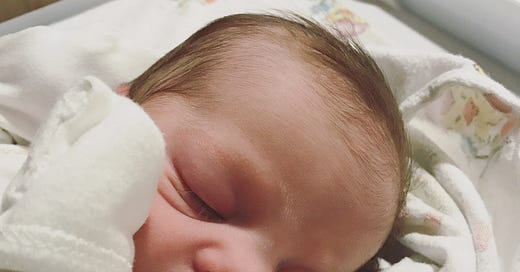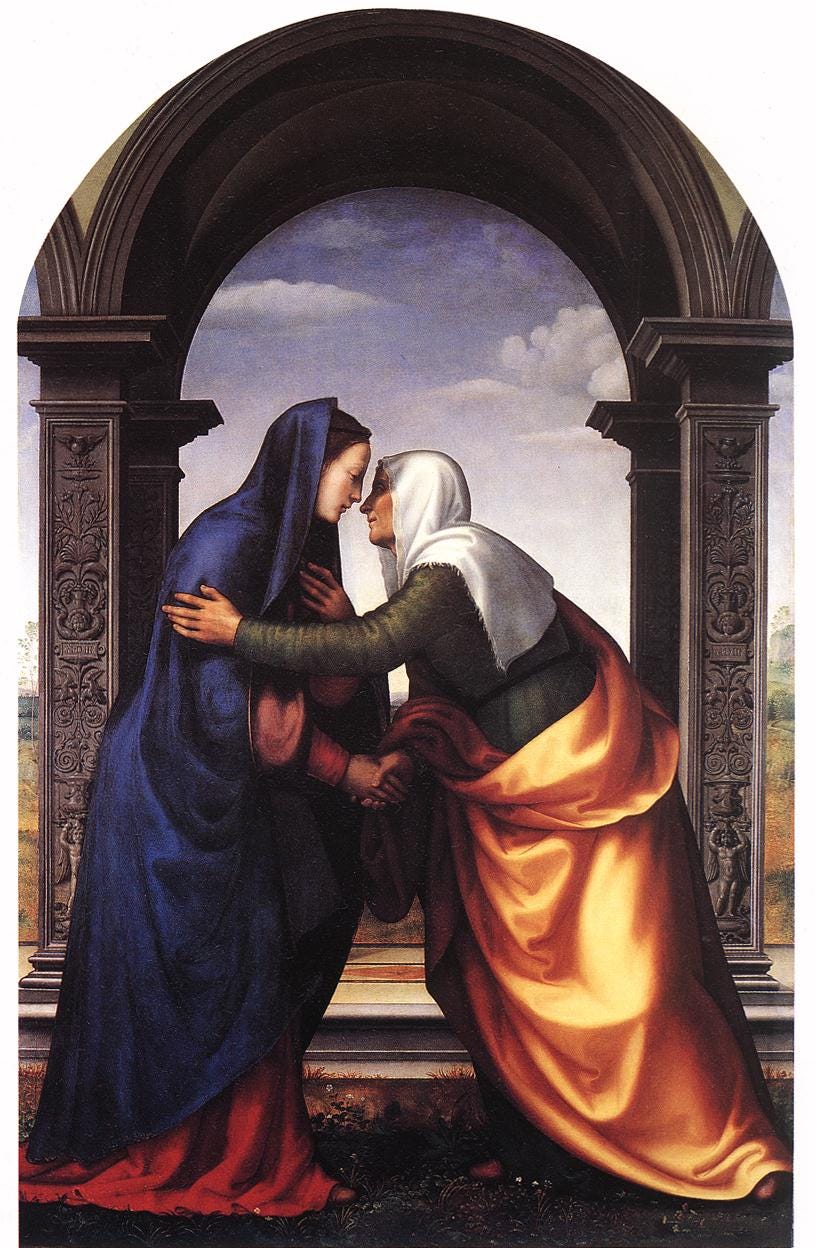Pain, The Visitation, and Almost Having a Baby in a Parking Lot
Motherhood: A Joyful and a Sorrowful Mystery
I’m sharing an essay today that I wrote a few months ago but has not seen the light of day. I’m hoping to share more pieces like this for my Substack subscribers in addition to This Week’s Miscellany and weekly Jane Austen reflections. If you’re not a subscriber it’s a great time to subscribe:
Overdue with my fourth baby, I felt the hospital triage room around me spinning. I closed my eyes and breathed through another contraction. The confusion of labor made forming sentences difficult. When the nurse brusquely assessed, “These aren’t real contractions. You’re not in active labor,” her words stung so deeply that she may as well have struck me across the face. My mind reeled and I was too disoriented to argue. “Go home and come back in a few days when you’re really in labor,” she insisted.
This was labor. I knew it. Or did I? I sobbed my way to the car, second guessing my experience. I gripped my husband’s arm as we made our way across the parking lot, stopping several times to breathe through more contractions. The physical pain coursing through my body was now accompanied by the wound of my suffering being dismissed, invisible, not worth addressing.
An hour after being kicked out of the maternity ward, we were back in the hospital parking lot moving slowly closer to the entrance between contractions as I begged my body not to push. My husband was silently scoping out grassy spots where he could deliver our daughter himself, knowing that at this point it was unlikely he could get me inside before she barreled her way into the world.
Against all odds, we made it through the door before I could no longer walk. I grabbed onto a water fountain in the hallway for support and started to scream as I could feel her crowning. In what seemed like a sitcom portrayal of a delivery, there were no wheelchairs to be found and I was rushed into a delivery room on a rolling office chair while shrieking the Hail Mary. There was no time to call for a doctor and my husband caught our child seconds after I was rolled onto a bed while I yelled, “I told you not to send me home!” to the same nurses who had dismissed me an hour before.
When they passed my beautiful baby to me I was still delirious from labor. “See? Here she is! I told you! I was in labor. I knew it,” I told them, holding out my adorable proof. I was desperate to have my pain, brushed aside an hour prior, be acknowledged, be seen.
The Visitation described in the Gospel of Luke is a beautiful moment of seeing. It’s my favorite mystery of the Rosary (the traditional Catholic prayers that meditate on certain moments in the life of Christ and the life of Mary). The Visitation is one of the five “joyful” mysteries and it’s easy to see why. Mary has been told about her cousin Elizabeth’s pregnancy by the Angel Gabriel at the Annunciation and she journeys to be with her. Having just been presented with the most overwhelming proposal in human history: “will you be God’s mother?” Mary’s attention surprisingly turns outward to her pregnant cousin.
As I reflect on these events in my imagination I see Mary packing up and rushing off to be present with Elizabeth who is finally with child after years of infertility. Mary goes “in haste” to her kinswoman. And in the moment of their meeting, St. John the Baptist jumps for joy in his mother’s womb in the presence of a reality still unknown and unacknowledged by the world but knit into the very bodies of these two women.
I love envisioning the encounter. Unbeknownst to the globe’s powerful figures, two women embrace in the middle of nowhere. Not wealthy queens, but seemingly unremarkable, vulnerable women around whom the whole significance of the universe is spinning. In their wombs are the forerunner of the Messiah and the Messiah himself. Has the spot of earth where they laughed for joy been ever blessed? Did their eyes fill with tears in that holy moment of comprehension and connection?
The desire for connection is wired deep within us. When a woman becomes a mother, that desire only intensifies. I wonder if it’s because mothering involves so much suffering. And while any suffering is difficult to bear, being alone in one’s suffering is intolerable and yet this is part of the human experience, too. Jesus himself, fully God and fully man, experiences not only suffering but crushing loneliness in the depth of his pain. In the Garden of Gethsemane, is it the anxiety of what is to come that is most devastating or the fact that Our Lord’s closest friends abandon him as he suffers?
What a balm it must have been for Mary and Elizabeth, these holy mothers, to be seen by each other when they met in the moment of the Visitation, to be rejoiced with, embraced, and comforted. But is modern pregnancy and motherhood much more like the sorrowful mystery, The Agony in the Garden of Gethsemane, than like the Visitation? While we die in childbirth less frequently than in ages past, have women lost touch with how deeply we are wired for accompaniment in the pain of motherhood?
It’s not groundbreaking news to anyone that giving birth hurts, but I have found pregnancy to be much harder to endure than labor pains–even under the strange circumstances of almost giving birth in a parking lot. I suffer from a condition called hyperemesis gravidarum during pregnancy characterized by extreme nausea and vomiting. Without prescription drugs, I cannot even keep down water. Even with the drugs, I’m debilitated by what feels like the stomach flu from hell week after week and month after month. It’s excruciating physically, but psychologically it’s worse. The blessed beginning of labor means the pregnancy is almost over. Thank God, it’s almost over.
I don’t share my experience to complain (I know deep in my bones how blessed I am to have four healthy children) but instead to illustrate that the more invisible pain the more isolating it can be. Recently, I observed a Twitter thread in which a young comedienne expressed her shock at her postpartum experience, the exhaustion of labor, painful breastfeeding with cracked and bleeding nipples, and sleep deprivation. Thousands of women chimed in with replies sharing their own surprise at these realities. “No one told me it would be like this,” they explained. They had never walked with anyone through the beginnings of motherhood and the pain of their new maternal experience bowled them over, often pushing them into postpartum depression as they wondered, “am I the only one who can’t handle this?” We were never meant to carry this pain unprepared and alone.
And as any mother knows, pregnancy and birth are the beginning, not the end of the suffering of motherhood. As our communities break down, I think this pain is more difficult to bear. We flock to Facebook, Instagram, and group texts as we crave the connections that acknowledge the sufferings, large and small, of motherhood. But it is not enough.
While theologians disagree about the degree of physical pain Mary experienced in labor, the suffering she experienced at the foot of the Cross surely qualifies her to understand the most excruciating depths of maternal pain. And Mary was given companions to help her bear that agony, St. Mary Magdalene and St. John. Even the Mother of God was not left alone in her pain.
In a culture in which the male body and male experience is normalized, being a woman can be disorienting. Instead of seeking community to support us in our suffering, we may avoid acknowledging our pain. We simply push through everything from painful menstrual cycles to exhausting pregnancies. It is considered admirable to beat one’s body into submission after a new baby, the more invisible the marks of motherhood, the better. “Is motherhood really painful?” we ask ourselves. “Or am I just weak?” It’s the second guessing of our own suffering that can be the most agonizing. And we often hide suffering in fear of our pain being dismissed, being considered too small to be acknowledged. “Others suffer more, why should I presume to need support for my scratches compared to their gaping wounds?” We hide our suffering in shame for not carrying it well or feeling completely smashed by its weight.
Like Mary and Elizabeth we need other mothers to share in our experiences of motherhood, but we need the support of others, too. Some of my most healing experiences have been in the confessional when a priest called to celibacy who has never given birth or raised small humans, listens patiently to my verbal outpouring of my mothering struggles and responds with acknowledgement of the difficulty of the vocation to marriage and motherhood. “What you’re doing–raising children, putting others before yourself–is hard. You are human. It is beautiful, but painful.” These, too, are Visitation moments.
So how do we bring more of the Visitation into the experience of motherhood? How do we ensure that women are not left alone in the Gethsemane of their pain? For someone to touch our wounds with a healing hand, we have to uncover them. What a gift when our vulnerability is met with a gentle affirmation that strengthens us and lets us know that our suffering does not denote a lack in us but simply the reality that we are being stretched, expanded, and the transformation hurts.
Christianity is the strange religion in which God himself chose to have a mother. He not only created motherhood but experienced the beauty of being mothered. His own mother’s need for accompaniment and her eagerness to comfort and support other mothers can remind us that we are not meant to journey through motherhood alone and that like Our Lady we should run in haste to accompany other women in their joy and their pain. For motherhood is both a joyful and a sorrowful mystery.
If you enjoyed this post, please share it. And if you find this Substack valuable, please consider upgrading to a paid subscription.






The question of “Is motherhood painful or am I just weak?” Is one I have asked myself A LOT and have almost always come to the conclusion that it’s painful because I’m weak. Absolutely loved this essay, Haley. What a balm. Did the nurses ever see and acknowledge your pain? Did they apologize? I had a similar situation with our second. I was sent home when I definitely should have been admitted.
I am not a mother, but this hit close to home. I am so lonely with no women friends, and when I suffer the loneliness of having no friends to confide in is so hard to bear! I can’t imagine how much worse I will feel once I have children with no female companionship.